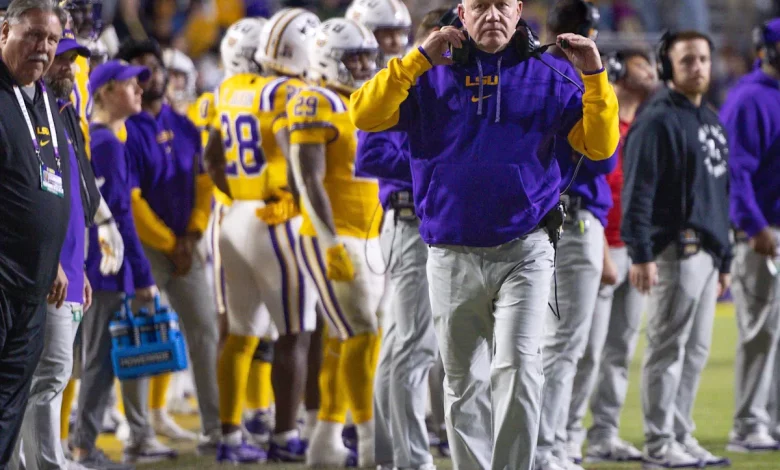LSU Football Analyst Departing Brian Kelly’s Staff, Heading Elsewhere for 2025 Season

As the 2025 college football season looms, LSU football fans have been met with a bit of unexpected news: one of the key members of Brian Kelly’s coaching staff, defensive analyst Nick Coleman, is departing the program to take on a new challenge elsewhere. While details about his next destination remain under wraps, the announcement has sparked a wave of discussion regarding the changes within the LSU football program. Coleman’s departure, coupled with a series of other personnel shifts within Brian Kelly’s staff, signals a transformative time for the LSU Tigers.
To fully grasp the implications of Coleman’s exit and what it means for LSU’s future, it is necessary to understand the context surrounding the coaching staff, the importance of analysts in modern college football, and how LSU football is positioning itself for success in 2025 and beyond.
The Role of a Football Analyst
In today’s college football landscape, analysts have become an integral part of coaching staffs, providing vital behind-the-scenes support that contributes to game-planning, player development, and overall team preparation. Analysts like Nick Coleman are often former coaches or football professionals who have the experience and expertise to assist with various aspects of the game, including film breakdown, opponent scouting, and game strategy. While analysts do not have the same hands-on responsibilities as position coaches, their input is critical in helping a team reach its peak potential.
Coleman’s role as a defensive analyst for LSU meant that he was responsible for breaking down game film, assisting with preparation for opposing teams, and helping to refine defensive strategies. His ability to evaluate talent and provide insight into the opponent’s strengths and weaknesses made him a valuable asset to head coach Brian Kelly and the entire defensive staff. Under his watchful eye, LSU’s defense saw improvements during the 2024 season, and his departure leaves a significant gap in a coaching staff that had grown accustomed to his input.
Why Did Coleman Depart?
Nick Coleman’s departure from LSU is noteworthy for a number of reasons. On the surface, it may seem like a routine coaching change, but there are factors at play that make it a bit more significant.
First and foremost, Coleman’s exit comes at a time when LSU football is undergoing a period of transition. Under Brian Kelly, the program has made steady progress, but there is still a sense that LSU is working to re-establish its position as one of the dominant programs in college football. After a solid 2024 season, in which LSU reached the SEC Championship Game and earned a bid to a major bowl game, the Tigers are poised to take the next step in their development. Having a strong defensive coaching staff, especially in the form of experienced analysts, is a key component of LSU’s aspirations for 2025 and beyond.
Coleman’s decision to leave the program could be attributed to several factors, including personal career growth opportunities and the nature of college football staffing. Analysts are often considered highly mobile, with many coaching staff members changing schools or roles as they work to climb the coaching ladder. If Coleman was presented with an opportunity to move into a more prominent position at another program, it would not be surprising that he would seize the chance to further his career.
Another potential factor in Coleman’s departure could be a desire for a fresh challenge. In the high-pressure world of college football coaching, analysts are often tasked with a great deal of responsibility, but they may also find themselves working in the shadows of more visible coaches. With the opportunity to step into a new role, Coleman could have seen this as a chance to broaden his experience and perhaps even take on a more direct coaching position.
Impact on LSU’s Defense
Coleman’s departure undoubtedly has implications for LSU’s defensive staff. While analysts like Coleman do not have direct coaching duties in terms of player development, they play an instrumental role in shaping the overall strategy and game plan for the defense. LSU’s defensive coordinator, Matt House, and head coach Brian Kelly will now need to adjust their preparation methods and find a replacement who can continue Coleman’s work.
In the modern game of college football, where tempo and offensive schemes have become more complex, having a sharp, analytical mind on the staff can make all the difference. The defensive staff will need to adjust to fill the void left by Coleman and ensure that LSU continues to progress in its quest to improve on defense. Given LSU’s recent success on defense, including their strong showing in 2024, the coaching staff will be focused on maintaining that level of excellence as they look to reload for the 2025 season.
Another key factor in LSU’s defense heading into 2025 is the roster itself. The Tigers have recruited well on the defensive side of the ball, with several talented players coming in to bolster the depth chart. As LSU continues to integrate new talent, the coaching staff will need to continue fine-tuning its system and ensuring that players are fully prepared to execute their assignments. Having a strong analyst is important in this process, as they can help with scouting, breaking down film, and finding any potential weaknesses in opponents’ offenses.
Brian Kelly’s Staffing Strategy
For Brian Kelly, the loss of Coleman is just one piece of the larger puzzle that is LSU football’s staffing structure. Kelly, who arrived in Baton Rouge in 2022, has already proven himself to be a capable and effective head coach, leading LSU to a solid 2024 season. However, to stay competitive in the brutal SEC and national landscape, Kelly will need to continue evolving his staff to maintain an edge over rivals like Alabama, Georgia, and Texas A&M.
As a result, Kelly has been proactive in making changes and improvements to his coaching staff, both on offense and defense. These moves are critical to LSU’s long-term success and could determine whether the Tigers are able to push for another SEC title or even a College Football Playoff berth in 2025.
The departure of Coleman may be part of a larger trend where LSU is actively seeking ways to optimize its staff for the future. In particular, Kelly and his staff have been focusing on attracting top-tier talent to both coaching and analyst roles, ensuring that every corner of the program is filled with individuals who are best equipped to drive the team forward. For example, LSU made a strong push to hire Alex Atkins, the former offensive coordinator at Florida State, to help shore up the running game and tight end coaching positions. Similarly, the team has worked hard to maintain continuity while simultaneously seeking out fresh perspectives and new blood to invigorate the program.
What’s Next for LSU Football?
With the departure of Coleman, LSU now faces a critical period of transition. While Coleman’s contributions were undoubtedly valuable to the team, LSU’s ultimate success in 2025 will depend on how the program adapts and evolves. Replacing Coleman’s role will require finding someone who can match his analytical acumen and offer fresh insights into the game.
At the same time, LSU must continue its work on recruiting and player development. The Tigers have built a strong foundation of talent, and the incoming class for 2025 is expected to be one of the best in the country. The combination of a dynamic roster and a capable coaching staff will be key to LSU’s ability to compete at the highest levels.
In conclusion, while Nick Coleman’s departure may leave a hole in LSU’s defensive coaching staff, it is just one part of a larger ongoing effort to keep the program on track for success. Brian Kelly and his staff are making the necessary moves to ensure that LSU is prepared for the 2025 season, and the program will continue to work hard to compete for championships in the SEC and beyond. The departure of Coleman may be a setback, but it also opens the door for new opportunities, both for Coleman and for LSU as it moves forward in the ever-competitive world of college football.









